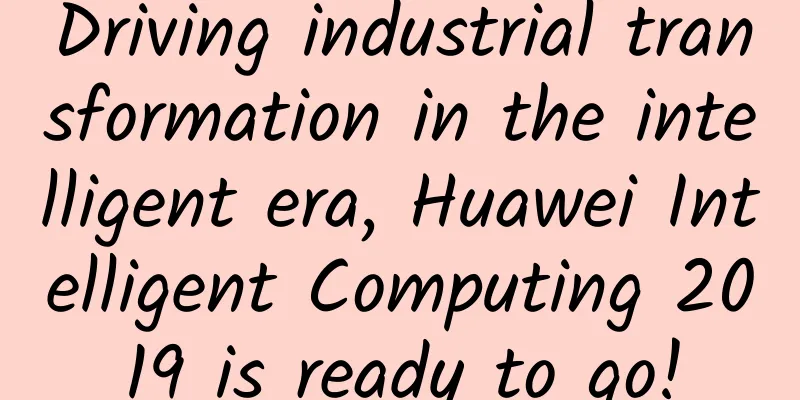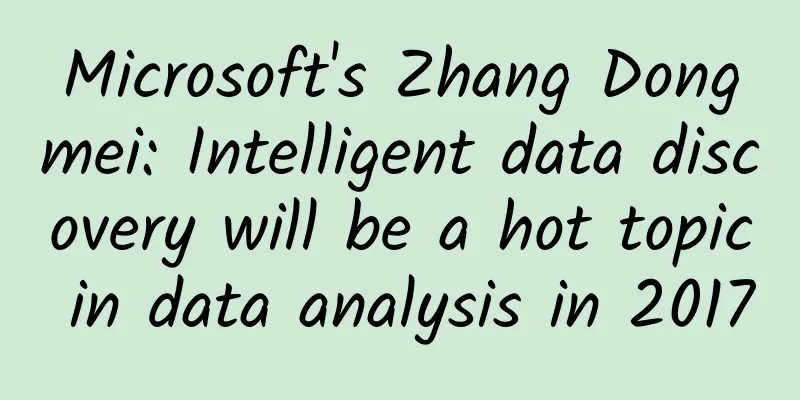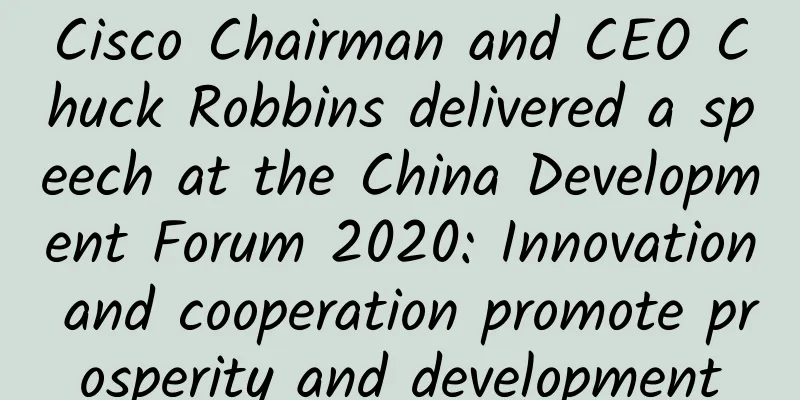Driving industrial transformation in the intelligent era, Huawei Intelligent Computing 2019 is ready to go!

|
[51CTO.com original article] The first time the reporter met Shi Bin, the marketing director of Huawei's Intelligent Computing Business Department, he couldn't help but "gossip" a question: As a department that has just been established for 4 months, are Huawei's intelligent computing activities arranged too "intensively"?
The "intensive" mentioned by the reporter is not just imaginary. Huawei's intelligent computing activities are indeed worthy of this word. In December 2018, Huawei announced the official establishment of the "Intelligent Computing Business Department". In just four months, Huawei's Intelligent Computing Business Department has successively released the Ascend series of AI chips, the ARM-based server processor chip Kunpeng 920, a series of chips for storage, network, management, etc., the launch of new FusionServer Pro intelligent servers, the first stop of the Intelligent Computing China Tour in Shenzhen, and the announcement of the launch of the Atlas artificial intelligence computing platform series products... Many people in the industry and reporters have the same question - has Huawei's intelligent computing already "got a good start" in the market, or does it want to create a "good start" through frequent market activities? When talking about the original intention of the event, Shi Bin explained it very frankly. "In the past, when people mentioned computing, the first thing they thought of was servers. But now, Huawei has redefined intelligent computing. We hope that more partners, customers, and analysts will understand Huawei's strategic layout of intelligent computing, so that they can agree with and join us in welcoming the intelligent era." Regarding the launch of many new products, he also said with a smile, "The development and commercial planning of new products were determined a long time ago, especially the AI-oriented artificial intelligence computing platform products, which are planned to be launched in the first half of 2019 to meet customer needs faster and better. There are still many things to look forward to in the second half of the year." With the right direction, Huawei's intelligent computing will become an industry legend The establishment of Huawei's Intelligent Computing Business Unit can actually be traced back to a long time ago. In May 2018, at Huawei's "Boundless Computing, Intelligent Mind Leading the Future" Intelligent Computing Media Conference, Huawei gave a very detailed interpretation of the definition of intelligent computing, and received very positive feedback from the industry at that time. Shi Bin told reporters that Huawei did decide to set up the Intelligent Computing Business Department after careful consideration. There are two main reasons: First, with the diversity of applications and data, diverse computing needs have been brought about. The trend of data edgeization is becoming more and more obvious. Computing is no longer equivalent to servers in the enterprise computer room. In order to meet the computing needs in all scenarios of end, edge and cloud, enterprises need AI full-stack and full-scenario solutions to add intelligent features to themselves and achieve intelligent upgrades. Second, traditional industries such as telecommunications, manufacturing, and energy cannot achieve digital transformation without the support of intelligent computing, which happens to match Huawei's development plan for the next few years. Huawei is willing to build the cornerstone for the intelligent era from now on and empower the entire industry. According to Shi Bin, the Intelligent Computing Business Department will undertake end-to-end project implementation and will also have its own independent market development department overseas. The purpose is to establish the right direction and create an industry legend through persistent and determined efforts. In order to achieve this goal, the Intelligent Computing Business Department will start from shaping Huawei's intelligent computing brand, market activity promotion, channel policy incentives and support. "The computing industry is different from other industries. It is updated very quickly. We are very confident in the market prospects." Four major advantages sound the first clarion call for intelligent computing, and Huawei's characteristics are difficult to copy The reporter learned that in 2019, the "highlight" of Huawei's Intelligent Computing Business Department is to deploy a full-stack, full-scenario intelligent computing platform around the x86 computing platform, ARM computing platform and AI computing platform, realize the "technology + ecology" dual-wheel drive model, and build an intelligent computing ecological alliance. In fact, this also shows the difference between Huawei and other traditional server manufacturers, because Huawei has accumulated more than 30 years of experience in the ICT field, and its product line not only has a deep technical foundation but also strong strength. At the same time, it has started to deploy chips very early, and has a very deep accumulation of basic science, materials science, engineering, etc. at the bottom of product equipment. This allows Huawei to quickly break through technical and product barriers once it clearly realizes the future potential of the intelligent computing field, and quickly respond to market demand through offline sales of computing platforms and online Huawei Cloud services. This is a path that other traditional server manufacturers find difficult to replicate. Shi Bin summarized the unique advantages of Huawei's intelligent computing into four points. ***Huawei can provide customers with computing power that exceeds user expectations. Chips are the key to intelligence. Huawei currently has five chips in the computing field: intelligent management chips, intelligent SSD control chips, intelligent network chips, AI artificial intelligence chips, and ARM processor chips. The five chips have strong performance and can be oriented to applications, unleash the best performance, and meet and exceed customer expectations. The second point is that Huawei's intelligent computing is based on chips and has built computing power coverage capabilities for all scenarios, covering user applications from the center to the edge. The third point is that Huawei equipment can ensure worry-free performance even in harsh environments. With the gradual advancement of edge computing, the IT deployment environment is becoming increasingly complex, and the requirements for equipment to adapt to the environment and engineering capabilities are getting higher and higher, which seems to be an innate advantage in Huawei's natural genes. Shi Bin said that in the past few years, Huawei has continuously challenged the limits, taking equipment to extreme environments such as the equator, Antarctica, and Mount Everest for testing and deployment, and successfully passed many extreme tests, such as impact airflow, fire and water resistance, rocket lightning and other extreme tests. The fourth point is that Huawei provides an integrated solution, which greatly reduces the threshold for using artificial intelligence. In Shi Bin's words, the complex deployment, installation, and tuning work are done in advance to ensure that users can "use it out of the box". This is also the best embodiment of Huawei's consistent service concept of "leave the complexity to ourselves and leave the simplicity to customers". "For Huawei's intelligent computing, the biggest difference compared to traditional manufacturers is that it can help users achieve intelligent upgrades of traditional infrastructure and intelligent reconstruction of traditional industries. In addition to the above four points, Huawei's capabilities in system architecture and ecosystem construction are also obvious to all. It is these factors combined that put Huawei's intelligent computing in a leading position from the starting line." Shi Bin concluded. Huawei has computing power, partners have algorithms, and customers have data. AI is right beside us! The release of any strategy is inseparable from the test of the market, and Huawei's intelligent computing is no exception. What is amazing is that Huawei's intelligent computing has delivered a very good answer. In Shi Bin's view, there are too many application scenarios for intelligent computing, and Huawei's intelligent computing is also actively exploring. At least now it is clear that Huawei has computing power, partners have algorithms, and with user data, the three elements for AI to become popular are already in place. Huawei is already at the forefront of AI practice. For example, in public transportation applications, Huawei and Shenzhen Traffic Police jointly developed and launched Shenzhen's "Traffic Intelligence". Based on Huawei's Atlas intelligent computing platform, it can process more than 1,000 photos per second and hundreds of millions of photos per day. At the traffic intersection in Longgang, Shenzhen, this platform can adjust the traffic light control strategy in real time according to the traffic congestion situation, increasing the traffic speed by 15%. In other words, in the past, cars followed the lights, but now the lights follow the cars. In the field of gene sequencing, through the integration of Huawei's intelligent computing platform and gene sequencing technology, the cost of gene sequencing technology can be reduced by 40%, and the efficiency and accuracy can be improved by 50%. In the high-voltage line inspection scenario, an AI module that integrates professional algorithms is built into a drone, and then the drone is sent out for inspection. When an abnormal situation is found, the AI module can perform real-time detection and judgment, send information back to the center, and provide various decision-making bases. In nursing homes, smart cameras are taught through artificial intelligence computing to make judgments. For example, if an elderly person falls in a corridor or ward, the police can be called immediately to avoid delaying the treatment and protect the health of the elderly. "In fact, there are many cases of industry AI intelligent transformation. They were not popularized in the past because of insufficient computing power or too high computing power. Now Huawei's intelligent computing provides affordable computing power to all walks of life. Combined with user data, it will definitely help vertical segments achieve more business innovations." Shi Bin said. In an interview with ***, Shi Bin emphasized that the fourth industrial revolution characterized by "intelligent technology" has become a powerful embodiment of the country's future competitiveness. Opportunities are rare, and Huawei Intelligent Computing has made all preparations in terms of strategic direction, team resources, and product layout, and is determined to create a full-stack, full-scenario intelligent solution covering cloud, edge, and end, using surging computing power to accelerate the intelligent upgrade of traditional data centers, enable the intelligent reconstruction of the industry, and build an intelligent world where everything is connected. [51CTO original article, please indicate the original author and source as 51CTO.com when reprinting on partner sites] |
Recommend
DesiVPS: $3/month-2GB/20G SSD/2.5TB/San Jose & Netherlands Data Center
DesiVPS is an Indian VPS hosting provider headqua...
5G IoT empowers a new life in the future
So far, the focus on 5G has been mainly on the co...
Do you understand the principle of Ethernet data transmission?
[[276059]] Routing is done based on the destinati...
WiFi is disliked by the EU and 5G may be selected as the communication standard for Internet of Vehicles
EU member states recently voted on a plan to adop...
Why are operators trying so hard to promote 5G packages?
[[426961]] In July last year, an article on Xinhu...
Detailed Explanation of WiFi Wireless Network Technology
Introduction to Wireless Networks Wi-Fi is a tech...
5G is coming, but the three major operators are playing "Three Kingdoms"
I wonder if you have visited the business halls o...
The battle for Wi-Fi 7 is about to begin
The summer of 2022 is coming, and the person to t...
[6.18] LOCVPS 20% off, top up 100 get 10 yuan / top up 5000 get 618 yuan, 4G memory package starts from 52 yuan/month
LOCVPS (Global Cloud) has launched this year'...
BudgetVM: $29/month - 4GB/200GB/100Mbps unlimited traffic/high security/Los Angeles & Japan data centers
It has been exactly one year since I last shared ...
Several secrets to protect cabling in green data centers
At present, the degree of enterprise informatizat...
Five disruptive features of 6G networks
The telecommunications industry is constantly pur...
PebbleHost: $19.99/month-E3-1220v2/8GB/480G SSD/1Gbps unlimited traffic/UK server
PebbleHost is a foreign hosting company founded i...
BandwagonHost has launched CN2 GIA at a special price starting from $74.5/year, with 1GB/20G SSD/1TB@1Gbps/multiple nodes available
Bandwagonhost has launched (restocked) a special ...
Jinan High-tech Zone, Inspur and Cisco signed a strategic cooperation memorandum
On the morning of December 4, Jinan High-tech Zon...









